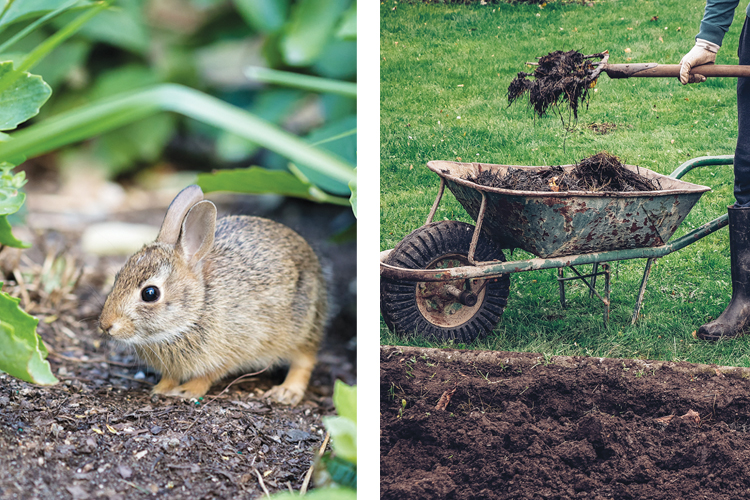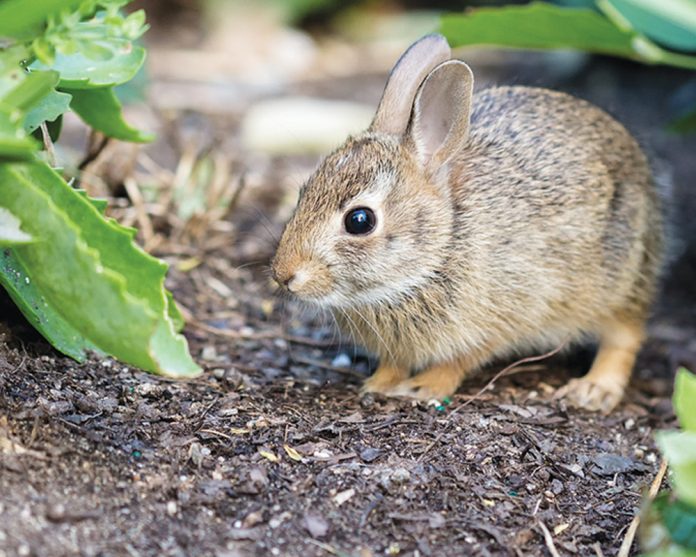
Happy February! If the cold and snow doesn’t have you dreaming about spring and getting back in the garden, perhaps these reader-submitted questions will!
Reader question: We have an issue with bunnies eating many of our flowers. Any suggestions?
Krista’s answer: Bunnies are adorable, however they can be destructive.
Your best bet is to have a physical barrier. The youngest of bunnies will not be able to hop up onto raised beds, and bigger bonus if you also have fencing at the top. If you don’t have or can’t do raised beds, choose fencing with holes small enough so curious youngsters won’t become stuck. Ensure there are no gaps between the bottom of the fencing and the ground; I recommend using garden staples. Animals, especially fluffy ones like bunnies, can squeeze through spaces that appear much smaller than their body.
I realize that it may be impractical or visually unappealing to enclose flower beds and borders with fences. You may find that garden sprays and oils with scents such as: cinnamon, peppermint, and garlic are effective deterrents. You can sprinkle cinnamon and garlic right from your spice cabinet, but you’ll have to reapply every time it rains or the sprinklers come on. I’m generally against harsher spices, such as red pepper flakes, as that just seems mean.
One final suggestion: tap evolution. A rabbit can’t tell the difference between a pug and a wolf. When I was having a really hard time with rabbits finding ways into my veggie garden, I asked dog owners to collect hair from their pet’s grooming brush, and I stuck clumps all around the edge. I also had a pup over to play near the garden. I know it sounds ridiculous, but it worked. The rabbits still came in the yard, but they avoided the garden surrounded by dog scent. If there’s a dog in your life, maybe you can give that a try.
Reader question: I’d like to do more organic gardening. Where can I get free manure?
Krista’s answer: Sadly, with the decline of the local family farm, it’s harder to come by places looking to offload manure. If there aren’t farms in your area, your local Cooperative Extension might be able to make some recommendations – they’re usually terrific for all things yard and garden. Many local townships, especially those with leaf collection programs, offer free compost days, (often paired with free mulch, if you’re looking for that too). Do any of your neighbors have a backyard chicken coop? It wouldn’t hurt to ask them! A word to the wise: If you end up with manure produced by a grazing animal, ask the farmer what herbicides may have been used on the pasture/hay and do some additional research. There are a few that, even after passing through the animal’s digestive tract, could end up having a negative impact on whatever you’re trying to grow.
Reader question: What does it mean to “harden off” a plant?
Krista’s answer: Hardening off plants means to slowly introduce (or re-introduce) them to the harsher outside weather after they’ve spent cozy time in your home or a nursery greenhouse. This helps protect against shock, which can result in dead or damaged leaves, stunted growth, poor flower or fruit production, or even plant death. Start by placing plants outside, (up against the house or other structure) where they are protected from the wind and in indirect sunlight. Do this for an hour or two during the warmest part of the day, once the outside temperature is in the mid-40s to 50s. Each day, increase the amount of time the plant spends outside, always remembering to bring it back inside for overnight. So long as any threat of frost is past, the plant should do just fine moving outside for the season after a week or so of hardening off. Give younger plants and seedlings a bit more time to adjust.












 20 lucky winners will win $500 each in prizes totaling $10,000.
20 lucky winners will win $500 each in prizes totaling $10,000. 